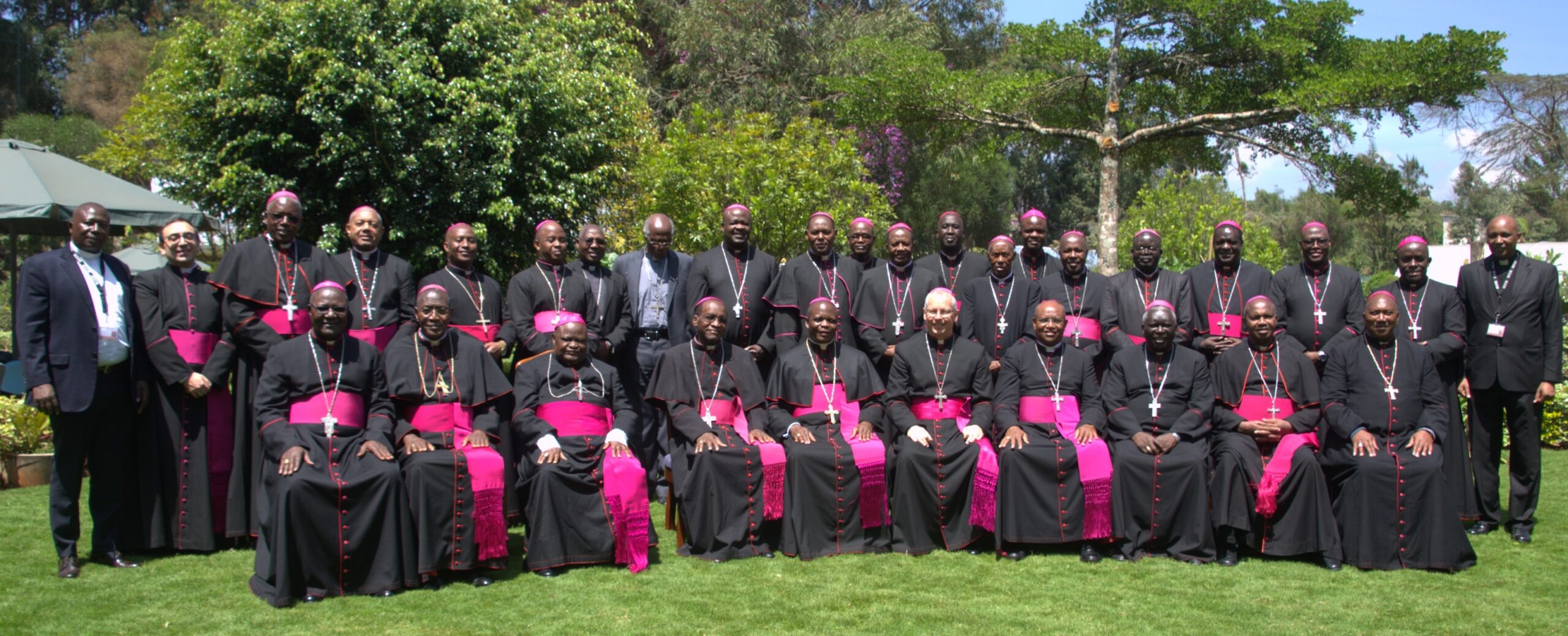By Paschal Norbert
NAIROBI, NOVEMBER 13, 2025 (CISA) —The Catholic Bishops have issued a passionate plea to the government to review newly enacted laws that risk undermining freedoms, ensure timely payment to hospitals under the new health scheme, and rallied the youth to register as voters ahead of the 2027 General Elections.
In a statement titled “Building a Kenya of Hope and Justice: Our Civic Duty”, the bishops said the contested Computer Misuse and Cybercrimes (Amendment) Act, delayed payments to faith-based hospitals under the Social Health Authority (SHA), and low voter registration, represent urgent moral and civic challenges that demand government accountability and citizen action.
Bishops Raise Alarm over Contested Laws
The bishops raised serious concerns over the Computer Misuse and Cybercrimes (Amendment) Act and the Land Amendment Act No. 21 of 2025, warning that they were passed hastily and could be misused to suppress civil liberties, especially freedom of expression and digital advocacy.
“We raise serious concerns about the way the law on the Computer Misuse and Cybercrimes (Amendment) Act, and the Land Amendment Act No. 21 of 2025, were crafted and enacted in a hurry. Kenyans have raised substantial concerns about the amendments, which were signed into law,” the bishops said.
They cautioned that unless properly reviewed, the laws could be exploited to intimidate critics and manipulate public discourse.
“We strongly recommend a necessary review lest they be abused to curtail the very freedom they ought to protect. Meaningful public participation would be necessary,” the bishops emphasized, adding “The fears Kenyans have expressed regarding these new laws should not be brushed off. They deserve to be listened to and, where necessary, corrective measures taken.”
Specifically, the bishops expressed concern that the Computer Misuse and Cybercrimes law could “be used to silence government critics, to abuse the right to advocacy, or even to manipulate the electoral process.”
They called for public awareness and amendment of offending clauses to ensure the laws serve to protect rather than restrict freedoms.
“Without careful and meaningful public participation, laws will be counterproductive, eroding public trust in the government. We recommend that the offending clauses be expunged and that specificity be provided on who the law targets,” the bishops stated.
They explained, “This would instill in the public an awareness that the law is meant to protect and expand their rights, enhance public order, and not to injure their freedoms.”
The bishops also warned against any government attempt to control religion through proposed legislation.
“The same can be expressed about the Religious Organization Bill. While certain legislation is necessary, the government should never be seen as attempting to regulate religion,” they cautioned.
Hospitals on the Brink
Turning to the healthcare sector, the bishops welcomed the new Social Health Authority (SHA) scheme but decried delayed payments to hospitals, particularly faith-based institutions, which they said are struggling to operate due to unpaid government claims.
“The benefits of the new Social Health Authority (SHA) medical scheme have been greatly advertised. For sure, many people have received treatment under the new SHA coverage in many hospitals, for which we are grateful,” the bishops said, while clarifying “However, the medical scheme cannot survive if the health providers, that is, the hospitals, are not timely and sufficiently paid for the services they provide to the patients.”
They condemned allegations of incompetence and fraud directed at hospitals demanding payment, insisting that such accusations are unjustified when institutions are merely seeking their rightful dues.
“We take exception to allegations of incompetence and fraud when we ask for our rights! The lingering inefficiencies of NHIF will eventually cost us dearly,” the bishops declared.
They urged the government to fast-track payment of all pending arrears owed to Catholic, faith-based, and private hospitals across the country, warning that many are on the verge of closure.
“We, the Catholic Bishops, still await the payment of all pending arrears owed to our hospitals, any other faith-based hospital, and private hospitals across the country, which are unable to offer basic services due to unpaid or delayed payments,” they stated.
“We ask that the matter of huge uncleared NHIF dues be fast-tracked and paid by government. Many faith-based hospitals are on the brink of closing due to unpaid claims.”
The bishops’ statement comes amid rising concern among healthcare providers about operational strain and declining patient care linked to funding delays, a situation that could jeopardize access to essential medical services, especially in rural and marginalized areas.
Youth to Register as Voters
The prelates also used the occasion to issue a clarion call to the youth to embrace voter registration and participation as an act of faith and civic responsibility, describing it as a “peaceful and constructive way to shape Kenya’s future.”
“The period of the accelerated voter registration is with us. We encourage all, especially the youth, to take up the challenge to view voter registration and participation in the 2027 general election as a concrete, peaceful, and constructive way to shape Kenya’s future through the electoral process,” the bishops urged.
They said that lasting national change can only be realized through civic engagement and democratic participation, reminding young people that their votes represent hope for accountability, justice, and unity.
“Every young person’s vote is a voice of hope for a more accountable, inclusive, and compassionate nation,” they said. “We therefore strongly urge all eligible youth to register. Registering as a voter secures your voice and contribution, enabling Kenya to continue growing in justice, peace, and unity.”
The bishops further appealed to the Independent Electoral and Boundaries Commission (IEBC) to make voter registration more accessible by expanding its reach into rural and remote regions.
“We realize that the numbers of voter registration are still low. We encourage the IEBC to increase the number of registration stations even in the remote areas,” they stated.
